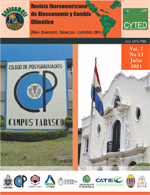Research needs and technology transfer on climate change in Nicaragua: An opportunity in the Bioeconomy
DOI:
https://doi.org/10.5377/ribcc.v7i13.11270Keywords:
Climate Change, Bioeconomy, Research, Transfer tecnologyAbstract
This study focused on identifying the gaps that exist in relation to knowledge of climate change, its impacts and opportunities, as well as identifying its potentialities and restrictions as an alternative to the Bioeconomy. An interview model was developed, whose universe was aimed at selecting three types of populations: Private Companies, Institutions of Higher Education: Teachers and / or administrators and decision makers of these institutions, Public Institutions and Non-Governmental Organizations. The results showed that the private sector gives higher priority to reducing costs and increasing efficiency, increasing profitability and customer retention in relation to responding effectively to the threats and opportunities of climate change, indicating that there is a knowledge gap in relation to the impacts and opportunities offered by climate change, while in teaching it was observed that there is an abundant training of master's degrees related to environmental issues, however the courses taught in universities on climate change are very scarce and on the other hand, there is no national postgraduate training program on Climate change and only 58% of the teachers interviewed carry out research tasks. In public institutions and NGOs they believe that the frequency of access to scholarships to acquire knowledge about climate change is low and that at the national level the source of knowledge about climate change very frequently used by teachers and researchers is the Internet.
Downloads
Published
How to Cite
Issue
Section
License
Copyright (c) 2021 Ibero-american JournalL of Bioeconomy and Climate Change e-ISSN 2410-7980

This work is licensed under a Creative Commons Attribution-NonCommercial-ShareAlike 4.0 International License.
Copyright © 2022 Rev. iberoam. bioecon. climate change Graduate School and UNAN-León, School of Agricultural and Veterinary Sciences / Department of Agroecology / Center for Research in Bioeconomy and Climate Change (CIByCC).






